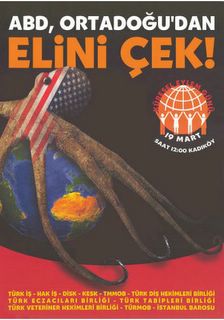Turkey, the US and the Middle East: spat or rift?

The New View of the US in Turkey?
In early March 2005 an announcement poster was displayed extensively throughout the streets of Istanbul as well as the lobbies and hallways of public buildings, inviting the public to a large scale anti-US demonstration, scheduled for March 19, 2005. The poster depicted the US as a giant octopus whose long tentacles strangled the globe. The signatories were the most prominent national organizations, trade and labor unions and professional associations of Turkey, each of them representing millions of members.
Signatories (at the bottom of the poster) were:
TURK-IS: Confederation of Turkish Trade Unions
HAK-IS: Confederation of True Trade Unions of Turkey (Islamic)
DISK: Confederation ofProgressive Trade Unions of Turkey (Leftist)
KESK: Confederation of Public Service Employees' Trade Unions
TMMOB: The Union of Chambers of Turkish Engineers and Architects
The Union of Turkish Dentists
Turkish Pharmacists Association
Turkish Medical Society
The Union of Turkish Veterinarians
TURMOB: Union of Chambers of Certified Public Accountants of Turkey
Istanbul Bar Association
The poster read:
"AMERICA, GET YOUR HANDS OFF THE MIDDLE EAST!"
This is drawn from an interesting article on the subject, from a Turkish-American viewpoint, here. I've noticed this drift in Turkish foreign policy towards laying greater stress on Islamic ties with the Arab or Iranian Middle East before. Is it significant?
Unlike Rice's recent pronouncement of how the US sees US-Greek relations, it's more than one government sounding a diplomatic klaxon at another by cosying up to an unfriendly third party. It seems to express a growing feeling in Turkish society of solidarity with the Ummah , and the AKP may view this trend in popular sentiment on foreign policy issues with a benign eye for a variety of reasons.
Firstly, there's the whole issue of the AKP's relationship with those of its own senior army officers who see guaranteeing Turkish secularism as their duty - and their right. The Turkish National Security Council must have been horrified when, against their party's instructions, one third of AKP deputies voted with the opposition Republican People’s Party to prevent US forces transiting through Turkey to attack Iraq.
From the NSC's point of view, Turkey should have participated in such an attack, to secure an armed presence in Kurdish areas. The AKP has strenuously tried to reassure a furious Washington that it has no intention of loosening ties with the US, but posters like the one above do not only appeal to secularist DSP supporters. The AKP's own constituency is becoming increasingly hard to satisfy; yet this mood in the country makes it easier for them to pursue a domestic agenda that may not suit the military guardians of Attaturk's legacy.
One could even speculate that the AKP may be using EU pressure for democratisation as a way of de-instututionalizing the Army's role in politics. While the EU can still use accession as a bait with which to lure Turkey towards the sort of society in which markets can operate properly, there's no reason to believe that the AKP hasn't worked out long ago that the bait is in fact unattainable. EU membership is a popular prospect in Turkey, but if and when Merkel kills the talks and it becomes clear that full accession is not going to happen, the mood in Turkey may well allow the AKP greater latitude. It's never been clear how genuinely the party is committed to secularism.
Secondly, the desire to prevent an economically viable Kurdistan emerging within a loose Iraqi confederation is a major factor in Turkish-US relations. Although the Kurds are eager to shelter under the American wing, it is unlikely that the US will allow them to destabilise borders - and may even push their leaders into taking a hard stance against the PKK in Turkey, which is defined as a terrorist organisation by the State Department. However, if things go to the bad in Iraq, if a constitution cannot be agreed or if Sunni-Shia rivalry becomes fiercer, the Kurds could prove useful proxies, protecting oil-supplies for instance. They are certainly making efforts to present themselves as acceptable secular and pro-American allies. There has even been a spate of statements 'condemning anti-semitism' in Kurdish material recently.
As always, one key question is whether the Kurds can achieve the sort of unity required to serve their own ends effectively, let alone anyone else's. William Eagleton's appointment as Bremer's assistant indicates that the US is at least trying to work from adequate background information. It's not just Kurdish carpets that Eagleton's an expert on.
In such a situation, one can imagine the AKP and the NSC both wishing to intervene in Iraq, but this time against US wishes. Better relations with fellow Muslims in Arab states and Iran would make taking that kind of action easier.

7 Comments:
This comment has been removed by a blog administrator.
This comment has been removed by a blog administrator.
This comment has been removed by a blog administrator.
This comment has been removed by a blog administrator.
This comment has been removed by a blog administrator.
This comment has been removed by a blog administrator.
This comment has been removed by a blog administrator.
Post a Comment
<< Home